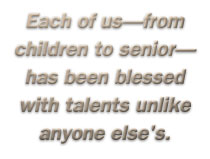
(Matthew 16:13-23)
May these words of this Peter be like a rock,
not a stumbling block!
|
|
"Who do you say
that I am?" Jesus asked. Simon Peter answered, "You
are the Messiah, the Son of the living God." And Jesus
answered, "Blessed are you, Simon son of Jonah! ... You are
Peter (petros), and on this rock (petra)
I will build my church..." Jesus then began to speak of
the rough road ahead. And Peter took him aside and rebuked him... "Get
behind me, Satan!" Jesus replied. "You are a stumbling
block..." (Matthew 16:13-23) May these words of this Peter be like a rock, |
"Can anything good come out of Nazareth"
Message preached January 19, 2003
Long Green Valley Church of the Brethren
Glen Arm, Maryland USA
based upon John
1:43-51, 1
Samuel 3:1-10
"Can
anything good come out of Nazareth?" That was Nathanaelís question
when his friend Philip told him about a  man
named Jesus, who was the son of Joseph from Nazareth. Nathanael, also known as
Bartholomew, was a scholarly sort, studying the scriptures in the shade of a fig
tree. He knew the law of God, the writings and the prophets, as any would-be
Pharisee should. So, when Philip came to him all excited about this Jesus fellow
who had just extended an invitation to become a disciple, Nathanael was just a
bit skeptical. Nazareth was a nowhere place, scripturally and actually.
man
named Jesus, who was the son of Joseph from Nazareth. Nathanael, also known as
Bartholomew, was a scholarly sort, studying the scriptures in the shade of a fig
tree. He knew the law of God, the writings and the prophets, as any would-be
Pharisee should. So, when Philip came to him all excited about this Jesus fellow
who had just extended an invitation to become a disciple, Nathanael was just a
bit skeptical. Nazareth was a nowhere place, scripturally and actually.
"Can anything good come out of Nazareth?" Pick a town from which you would least expect to hear anything good, and that would be Nazareth in your experience. For me itís Kokomo, Indiana. It was there I first learned of bigotry at my Uncleís knee, as he ranted about blacks and Jews. Kokomo still carries for me the cloud of his Manic-Depressive illness whenever I think of it.
Where is your Nazareth? Who might be a Nazarene for you? Thatís someone from whom who youíd least expect anything of value. Thatís how Nathanael saw it. "Can anything good come out of Nazareth?," he asked his friend. And Philip, with a raised eyebrow, challenged him to "Come and see." The rest is history, for Nathanael discovered that something good had come from Nazareth, and he became a disciple himself (John 1:43-51).
Can anything good come from an unexpected place? We grow so accustomed to things happening in particular ways, that we often lose track of the fact that once upon a time those ways were brand new, untried and not yet proven true. Likewise, we tend to look only to certain people when we are in need - persons who have already shown their talents and abilities. Itís human nature to do that. After all, can anything good come from Nazareth? - from unexpected places? unexpected persons?
Take the
story of young Samuel. When we first encounter him he is but a tear in his
motherís eye, a yearning unfulfilled. However, God answered Hannahís
prayers, and the birth of Samuel ended her childlessness. In fulfillment of her
vow to God, Hannah left her newly weaned son at the Temple in Shiloh to be
raised a servant of God by the priest, Eli. But really, who would expect much good out of this child - except, perhaps, his own mother. After all,
Samuel was not a Levite. Didnít God say the sons of Levi were the be the
"holy guys," ... forever and ever, even.
expect much good out of this child - except, perhaps, his own mother. After all,
Samuel was not a Levite. Didnít God say the sons of Levi were the be the
"holy guys," ... forever and ever, even.
Can anything good come out of Ephraim, especially from the son of a woman Eli at first considered a "drunken spectacle" (1:14) when he saw her praying with lips moving but no sound. Sort of like those first Christians in Jerusalem, speaking in different languages, who were accused of public inebriation. Whoíd have expected any good out of those characters? But God has a peculiar habit of calling out to unexpected quarters.
We read an example of this in the scripture passage from 1 Samuel. This boy was the very one God chose as his instrument. Looking back on the incident through the eyes of the narrator, we hold privileged information. We know that this is the voice of God calling. But neither Samuel nor Eli had a clue about this at first. Youíd think that, of all places, folks in the Temple would be the most ready to hear God speak. But that was not the case. It took a while. Maybe as long as it takes us nowadays in church. Isnít this where folks are most ready to hear God's voice? Does God speak here? Are we listening? Do we expect anything good to come out of Long Green Valley?
The situation among the children of Israel in the days of Eli and Samuel was not too hot. It says that "the word of the Lord was rare in those days; visions were not widespread" (3:1b). It wasnít so much that people were moving away to foreign places, or that money was getting tight. What was lacking was a sense of direction. Oh, the reasons for it were probably many and varied. Itís always easy to point the finger. No doubt it had something to do with the cynicism of Eliís sons, who were supposed to be listening and seeking as priests after the order of Levi. But they couldíve cared less, just so long as they got what they wanted.
However, God had a different idea, a continuing dream for his people. And young Samuel was a part of that dream. God called his name. After a few false starts, Samuel and Eli got it straight. Eli finally recognized a familiar voice, though it was addressed toward an unexpected direction. He encouraged Samuel to stand before the Lord and respond, "Speak, for your servant is listening." A new chapter began. What God had to say to Samuel was not easy for Eli, later, to hear, since it was in part an indictment of the ways things were. To his credit, though, the old priest of God recognized the dawning of a new day. "It is of the Lord," he said, "let God do what seems fit to him" (3:18).
God knows us very well - quite intimately, in fact. Thatís one of our somewhat embarrassing statements of faith. As the 139th Psalm asserts, God has searched us and knows us inside and out, up and down - our past, our present, and our future. Wonder-filled, awesome, is this knowledge. Obviously, then, God can see in others what we are unable to perceive. The same is true of us - what God sees in me ... what God sees in you.
In seems
fitting that in this season of Epiphany, which begins with a celebration of the
wise men bringing gifts to the  Christ
child, that we might take time to ponder the gifts that God gives to all who
seek to follow the One who is our "bright and morning star" (Revelation
22:16). One of the tasks that I am finding to be more and more enjoyable
is helping others to discover
their gifts from God. Maybe it has something to do with growing older myself
and not being so focused upon letting my own light shine. Perhaps itís a
natural shift within a parent as he discovers what a joy it is to see his
children grow into the unique persons God created them to be, gifts and all.
Christ
child, that we might take time to ponder the gifts that God gives to all who
seek to follow the One who is our "bright and morning star" (Revelation
22:16). One of the tasks that I am finding to be more and more enjoyable
is helping others to discover
their gifts from God. Maybe it has something to do with growing older myself
and not being so focused upon letting my own light shine. Perhaps itís a
natural shift within a parent as he discovers what a joy it is to see his
children grow into the unique persons God created them to be, gifts and all.
I believe it is an often neglected task of the church to discern and encourage these gifts in the lives of each person. I know I have not done my job as well as I should. When I baptize someone, I pray that the Lord will unleash in them the Spirit and its gifts - especially the gift or gifts that will be unique to their calling as part of the body of Christ. But how am I helping that person to respond to Godís voice, once they say, "Speak, for your servant is listening"? How well are we all doing when it comes to this task?
I believe that I, that we must grow in this area. I have a dream that we might shift the way we operate as a church. Currently we call people to positions of responsibility without first discerning their gifts. We discern what we think are our needs, which usually are the needs weíve perceived all along - what it takes, we think, to run the church. Then we take those who have said "yes" to our calling and fit them in wherever there is an empty spot. In the process, round pegs can be jammed into square holes, or vice versa. And then we wonder why persons burn out, why they do their "time," and rarely say "yes" again.
What would happen if we began with the gifts God has already manifested among us and work in the opposite direction? Letís see, weíre gifted in this, this, and this way. What is God doing here by providing these gifts? Where does God seem to be leading us? We want to do this, but God hasnít given us what we need to move in that direction. However, we have been given this, so maybe that is where we should travel instead. Do you catch the difference? It seems to me that this is actually the way of operating promoted in the New Testament.
God calls
us to seek out the gifts that are here, already given - some of which we may not
even be aware of, because they are new. Because we have discovered, as a
cornerstone of our faith, that something good indeed has come out of  Nazareth,
it should be our desire to hear Godís calling in places where and persons whom
we might not ordinarily expect. Otherwise, weíre always calling the same
people to do the same things they always have done.
Nazareth,
it should be our desire to hear Godís calling in places where and persons whom
we might not ordinarily expect. Otherwise, weíre always calling the same
people to do the same things they always have done.
Of course, we donít know each other as well as we could ...thatís a given. Even those to whom we are closest are, in many ways, still a mystery to us. But calling out the gifts in another person is not just a matter of how well we know them. Itís a matter of how well God knows them, and how open we are to hearing God speak out of that knowledge. Now, if we wait until someone exhibits a talent before we call it out of them - which does make sense, Iíll grant you - are we really listening to the same voice that called out Samuel?
Itís sort of like not giving a person a chance until theyíve had some experience. Only how does someone gain experience until you give them a chance? Yes, willingness is an important component for a person to exercise a gift. Otherwise thereís no real incentive to do anything other than just play around at it. But itís a two-way call, inward and outward. And often the first step comes from the outside as God speaks and others hear and help clarify the call.
Donít get hung up, though, in certain expectations of how Godís voice comes to us. It may be in the most fleeting of notions, rather than in an earth-shattering noise. And if itís the tried and the true, the most obvious of persons or places, then maybe itís too obvious to be "of the Lord." It must be said, though, that God does speak in familiar ways and people, as well. But this is not the way it has to happen. God is not locked into a particular way of operating. He is radically free to do as he sees fit. And because God is free to act, so are we.
"Now
there are varieties of gifts," wrote the apostle Paul. "All
these are activated by one and the same Spirit,  who
allots to each one individually just as the Spirit chooses" (1
Corinthians 12:4a, 11). That is, it is out of Godís knowledge of us,
individually and corporately - our abilities and our needs, that persons are
called to be visionaries, implementors, communicators, healers, encouragers,
teachers, whatever the gift may be, or the name we give it.
who
allots to each one individually just as the Spirit chooses" (1
Corinthians 12:4a, 11). That is, it is out of Godís knowledge of us,
individually and corporately - our abilities and our needs, that persons are
called to be visionaries, implementors, communicators, healers, encouragers,
teachers, whatever the gift may be, or the name we give it.
But it all goes back to the basic question, "Can anything good come out of Nazareth?" Until we are able to say "Yes, something good can come out of Nazareth!," and start listening for God to speak in unexpected directions - in other persons, or in ourselves - then these words will be as true of us as they were of Eli's generation: "The word of the Lord was rare in those days; visions were not widespread." Praise God that Jesus continues to invite us to "Come and see."
| online resources for these scripture texts |
For commentaries consulted, see John or 1&2 Samuel. |
©1994, 2003 Peter L. Haynes